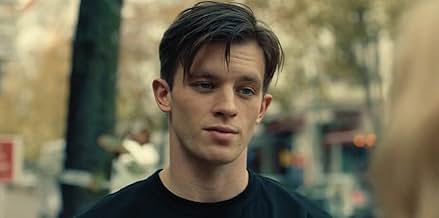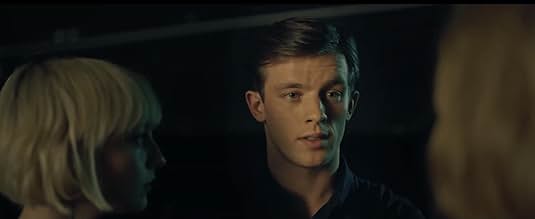CALIFICACIÓN DE IMDb
5.6/10
1.6 k
TU CALIFICACIÓN
Maxi, el superviviente de un ataque terrorista, se une al seductor estudiante Karl y se convierte en parte de un movimiento juvenil europeo; uno que apunta a nada menos que tomar el poder.Maxi, el superviviente de un ataque terrorista, se une al seductor estudiante Karl y se convierte en parte de un movimiento juvenil europeo; uno que apunta a nada menos que tomar el poder.Maxi, el superviviente de un ataque terrorista, se une al seductor estudiante Karl y se convierte en parte de un movimiento juvenil europeo; uno que apunta a nada menos que tomar el poder.
- Premios
- 1 premio ganado y 6 nominaciones en total
- Dirección
- Guionista
- Todo el elenco y el equipo
- Producción, taquilla y más en IMDbPro
Argumento
¿Sabías que…?
- Citas
Karl: What matters most to you?
Maxi Baier: Trust. What is the worst thing in the world for you?
Karl: To die for no reason.
Maxi Baier: And the best?
Karl: To die with purpose.
Opinión destacada
Summary
Christian Schwochow's film is a disturbingly topical dystopia, an incursion into the renewed modes and operations of the new neo-fascist youth movements in Europe and which find their replicas in other parts of the world, such as the so-called "libertarians" of Argentina. For instance. A pan-European phenomenon with TED conventions and progressive clothes and manners that will reveal, with the excuse of insecurity, his white supremacist motivations against immigrants and his vocation for power. And that raises a question: how solid do our principles stand when we become victims?
Review
After suffering a family loss, Maxi, a young student (Luna Wedler) is seduced by Karl, a young far-right activist (Jannis Niewöhnner) and introduced into a European neo-fascist youth movement.
Maxi is seduced by the beautiful Karl (a Machiavellian Jannis Niewöhnner, in a character reminiscent of the protagonist of Hater) and invites her to meet Re / Generation, an organization for "change". To what extent will someone who is processing a grief allow themselves to be used? Will it follow the path of the protagonist of the film Hadewijch, by Dumont? What ideological changes can the condition of victim produce? Luna Wedler (the protagonist of the Biohackers series) deals with an ambiguity that makes her character very interesting. The opposite of her is Alex, her father (great performance by Milan Peschel), who has other ways of processing a duel that will distance them.
Beyond some script weaknesses, Christian Schwochow's film is a disturbing foray into the renewed modes and operations of the new neo-fascist youth movements in Europe. It should be noted that the phenomenon is not limited to the Old Continent, since it finds its replica in the so-called "libertarians" of Argentina, for example.
We are far from the world of proletarian neo-fascists sons of German reunification. It is now about organizations (in this case the fictitious Re / Generation; attention with its logo) to which middle class young people adhere, many of them students, who organize conventions with TED talks and new age airs, making intensive use of social networks and who spuriously seize slogans, topics and ways of the progressive left. The mask of false progressivism does not take long to fall and show its true face, its obsession and its fanaticism: a pan-European white supremacism whose target is immigrants and which agitates the issue of "insecurity" and "change"; It is a phenomenon that does not end in watertight nationalisms because "they - immigrants - are everywhere." The film, focused on young people, leaves out of the field the economic interests that move behind and that sustain these movements and groups, very organized and with a vocation for power, and who do not repair the means to achieve it.
Je suis Karl describes a real state of affairs and goes one step further, painting a disturbingly topical dystopia.
Christian Schwochow's film is a disturbingly topical dystopia, an incursion into the renewed modes and operations of the new neo-fascist youth movements in Europe and which find their replicas in other parts of the world, such as the so-called "libertarians" of Argentina. For instance. A pan-European phenomenon with TED conventions and progressive clothes and manners that will reveal, with the excuse of insecurity, his white supremacist motivations against immigrants and his vocation for power. And that raises a question: how solid do our principles stand when we become victims?
Review
After suffering a family loss, Maxi, a young student (Luna Wedler) is seduced by Karl, a young far-right activist (Jannis Niewöhnner) and introduced into a European neo-fascist youth movement.
Maxi is seduced by the beautiful Karl (a Machiavellian Jannis Niewöhnner, in a character reminiscent of the protagonist of Hater) and invites her to meet Re / Generation, an organization for "change". To what extent will someone who is processing a grief allow themselves to be used? Will it follow the path of the protagonist of the film Hadewijch, by Dumont? What ideological changes can the condition of victim produce? Luna Wedler (the protagonist of the Biohackers series) deals with an ambiguity that makes her character very interesting. The opposite of her is Alex, her father (great performance by Milan Peschel), who has other ways of processing a duel that will distance them.
Beyond some script weaknesses, Christian Schwochow's film is a disturbing foray into the renewed modes and operations of the new neo-fascist youth movements in Europe. It should be noted that the phenomenon is not limited to the Old Continent, since it finds its replica in the so-called "libertarians" of Argentina, for example.
We are far from the world of proletarian neo-fascists sons of German reunification. It is now about organizations (in this case the fictitious Re / Generation; attention with its logo) to which middle class young people adhere, many of them students, who organize conventions with TED talks and new age airs, making intensive use of social networks and who spuriously seize slogans, topics and ways of the progressive left. The mask of false progressivism does not take long to fall and show its true face, its obsession and its fanaticism: a pan-European white supremacism whose target is immigrants and which agitates the issue of "insecurity" and "change"; It is a phenomenon that does not end in watertight nationalisms because "they - immigrants - are everywhere." The film, focused on young people, leaves out of the field the economic interests that move behind and that sustain these movements and groups, very organized and with a vocation for power, and who do not repair the means to achieve it.
Je suis Karl describes a real state of affairs and goes one step further, painting a disturbingly topical dystopia.
- danybur
- 1 dic 2021
- Enlace permanente
Selecciones populares
Inicia sesión para calificar y agrega a la lista de videos para obtener recomendaciones personalizadas
- How long is Je Suis Karl?Con tecnología de Alexa
Detalles
- Fecha de lanzamiento
- Países de origen
- Sitios oficiales
- Idiomas
- También se conoce como
- Je Suis Karl
- Locaciones de filmación
- Productoras
- Ver más créditos de la compañía en IMDbPro
- Tiempo de ejecución2 horas 6 minutos
- Color
- Relación de aspecto
- 2.35 : 1
Contribuir a esta página
Sugiere una edición o agrega el contenido que falta

Principales brechas de datos
By what name was Je suis Karl (2021) officially released in Canada in English?
Responda
![Ver Trailer [OVS]](https://m.media-amazon.com/images/M/MV5BMTdjMTA1MjYtYmZkMy00MTE0LTk3MGItYjdhM2M3ZjgxYzNlXkEyXkFqcGdeQXRyYW5zY29kZS13b3JrZmxvdw@@._V1_QL75_UX500_CR0)



























